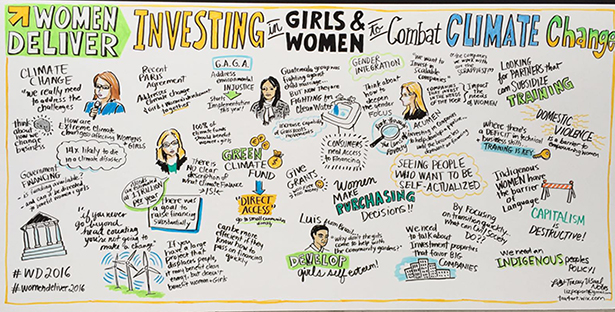By Ursula Miniszewski, Program Officer, Gender and Environment
In late May, Global Greengrants Fund, the International Network of Women’s Funds, and the Women’s Environment and Development Organization (WEDO) joined forces at the enormous Women Deliver conference in Copenhagen. Our goal: to shed light on the critical connection between women and the environment. We co-led three sessions related to the environment and climate change; a first for this conference, primarily focused on women’s health. Hopefully, this reflects a growing trend of approaching women’s health from a more inclusive and holistic perspective.
Looking back, here are three big takeaways from the conference:
1. The field is wide open: There are a lot of problems in the world that require funding. But considering the broad scope of issues faced by women and girls, it’s embarrassing that only 19 percent of human rights funding is directed to women and/or girls. Even less of that goes to women and girls at the grassroots level—and just a mere fraction of a fraction goes to grassroots women and girls addressing climate change and environmental rights.
Think of it this way: Money going to female environmentalists represents just one leaf on one branch of a 50-foot tree.
The good news? There’s a lot of money available and conferences like Women Deliver are important spaces for women who don’t normally have access to large, international platforms to share their experiences and possibly influence high-level decision-makers and funders. Download Climate Justice & Women’s Rights for tips on how to direct more resources to women working for environmental change at the community level.
Majandra Rodriguez Acha (TierrActiva Perú), Betty Barkha (Asia-Pacific Forum for Women, Law and Development), Eleanor Blomstrom (WEDO), and Ursula Miniszewski (Global Greengrants) present a panel discussion about women’s rights and climate change.
2. This is the era of youth: Youth climate activists are taking the future into their own hands. They are the backbone of the global climate movement. Take Majandra Rodriguez Acha. She is a Young Feminist Fellow for Climate Justice, who co-founded TierrActiva Perú and sits on our Next Generation Climate Board. She trains young activists in her community about climate justice, working toward her vision of “system change, not climate change.” Read what Majandra thinks must be the next step toward activating young women activists.
3. Everything is related. Climate change isn’t happening in a vacuum. There are economic, political, and social factors at play. This year, the tagline for Women Deliver was, “investing in girls and women powers progress for all”—in other words, women are sound economic investments. Investing in women is an important call to action for governments and private industry. But equally important is the need for honest acknowledgement and commitment to addressing inequality. Investing in women should also stipulate ensuring that they first have access to the money and resources—a right that many women around the world are deprived of.
Similarly, women’s rights to things such as safety, land, health, and information must be at the core of climate action. Otherwise, just and lasting solutions to the climate crisis will elude us: an outcome that none of us can afford.
Shalini Eddens (Urgent Action Fund for Women’s Human Rights), Judith Pasimio (Purple Action for Indigenous Women’s Rights), Ursula Miniszewski, Augusta Hagen-Dillon (International Network of Women’s Funds), Carla Lopez (Fondo Centroamericano de Mujeres).
Women Deliver is heartening example of an international forum with significant visibility and influence that is broadening its own definitions of women’s health and inviting different perspectives to the table. For WEDO’s highlights from Women Deliver, click here and scroll to the bottom.
I’m particularly proud to work for an organization that understands the overlapping issues that contribute to climate change. Climate change doesn’t impact people equally, and Global Greengrants is committed to supporting those most impacted—such as women, youth, indigenous groups, and rural communities—to develop and implement real solutions. Having the topic of women and climate change on the table at this year’s Women Deliver was a big milestone, and a positive step towards empowering women tackling the climate crisis.



